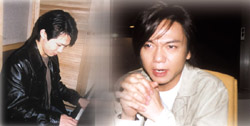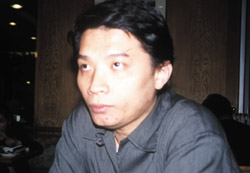 Online
Edition
Online
Edition | From
the editor Letters to the editor Milestone Answerman Campus Life Periscope Social Issues People Photo Features Education Channel Culture & Leisure Science |
| Last
Issue Archive |
| About
Varsity Advertise Media Links CUHK homepage JLM homepage |
Also in People
Making one's way through compromises
Related
Links
South China Athletic Association
Write to us
Back to main

The ups and downs in the life of a composer
By Phoebe Wong
Writing
music is not easy money.
Mr.
Eddie Ng made a change in his music career in 1994.
He
had been a singer, but he felt intimidated by the image-oriented entertainment
industry.
He
said, “People only look at the image of singers.
“However,
I am weak in fashions. Therefore, I would rather be a composer.”
He
buried himself in learning different musical instruments in 1994 and 1995.
Said
Mr. Ng: “I learned to play piano and write music with computer
programmes.”
He
said that many songs were rejected at first.
Then,
in 1998, Mr. Ng received many awards in various music shows.
Although
one’s appearance is not so important for composers, he is working to
create a healthy image.
Said
he: “I do not look energetic enough and my appearance disappoints
people.
“Now
I want to be healthy and tidy. This is a way to show respect to others.”
Another
well-known composer, Mr. Ng Lok Shing, who had started his music career in
1996, said that there have been dark days.
He
said, “Even if I work very hard, my music may not be appreciated.
“Record
companies may intervene in the composition. Songs aren’t presented in
the style I have wanted.
“Some
styles may not be broadcast because they do not suit the preferences of
companies and singers.”
He
said that a style similar to that of previous popular songs is expected.
He
said, “ For some companies, it has to go through 10 people for
approval.”
Mr.
Ng said that he had to alter songs until final approval was given.
The
only resort is to insist.
“In
Hong Kong, there are not many singers. I should grasp the opportunity to
cooperate with different people.
“I
will not avoid dealing with them just because they are harsh,” said he.
He
said, “Some companies give me more freedom. Only one person is
responsible for approval.
“Trustworthiness
is of utmost importance. If I’m controlled by others, my imagination and
creativity will be hindered.”
Regarding
inspiration, he said that anything could stimulate his thinking.
He
said, “I can write songs even in a noisy restaurant.
“However,
there should at least be no background music.
“I
would follow the music easily because I’m too sensitive to music.”
Mr.
Eddie Ng has different preferences.
Relaxing
and quiet environments are important to him.
“Candles,
evening and suburbs — all these help me compose songs with long
beats,” he said.
To
compose songs with fast beats, drums
are necessary. Trivial matters can provide him with inspiration.
He
said, “When I turn on the computer, the sudden flicker of light can help
me compose songs with fast beats.”
Another
composer, Mr. Chan Fai Yeung, said that inspiration comes easily.
Mr.
Chan has become a full-time composer since 1997. He has written many songs
for pop singers, including Faye Wong, Andy Hui and Eason Chan.
He
said, “Despite an expenditure of $10,000 on albums each month, I do not
look for inspiration deliberately.
“Many
ideas pop up when I am on the street. I jot down every little detail.”
He
said that he could use these fragmented thoughts to write songs at any
time.
In
fact, he had never thought of being a composer.
He
was a studio engineer before.
“After
working for 2 to 3 years in the studio, I learnt music composition,”
said he.
As
with the other composers, many album companies did not appreciate his
songs at first.
However,
he never felt frustrated.
He
said, “When I listen to those songs again, they are really below
standard.”
Regarding
his job, he enjoys the process more than the outcome.
He
said, “Since I put down the first note, I have listened to them
thousands of times. It is not interesting to listen again.
“All
is finished when it is finished.”
Mr.
Chan is not astonished when the popularity of a song is low despite
immense time and effort spent.
He
said, “I do not think it is a failure.
“The
songs that I only spend 3 hours on may become more popular than those I
spend a week on.
“My
taste in music appreciation is different from that of the general
public.”
Mr.
Ng Lok Shing said that the quality of music is not measurable.
He
said, “ Music is just a feeling. People have their own responses.”
Mr.
Chan said it is a challenge for him to compose music in Hong Kong.
“Hong
Kong people want everything to be fresh and trendy. They fear being bored.
“Hong
Kong has no culture. You have written a song today, and you will have to
compose another song in a different style the next day.”
Mr.
Ng Lok Shing said that it was hard for composers to get ready for
different styles.
Mr.
Eddie Ng said that to accommodate the audience’s preferences is another
difficulty.
Said
he: “Without recognition from the disc jockeys, my songs will not be
broadcast widely; however, their taste is different from that of
consumers.
“I
need to strive for a balance in this dilemma.”
To
become a successful composer, both Mr. Eddie Ng and Mr. Ng Lok Shing say
hard work is essential.
Mr.
Eddie Ng said, “Luck is not with me so far.
“I
gain recognition from others because I work hard.”
Mr.
Ng Lok Shing said, “Whether one can succeed depends on one’s
performance, public response and chances.”
“All
these should be well coordinated with good timing.
“Therefore,
it is a matter of luck.”
In
the past 2 years, many people have said that composers were not creative
enough or even copied from other songs.
But
Mr. Chan said that people abuse the word “copy”.
He
said, “I never use the word ‘copy’. Sometimes it is just that the
style of a song is similar to another.
“The
two songs are not necessarily the same.”
Mr.
Eddie Ng said that he would just copy a song’s feeling, not the exact
melody.
Mr.
Ng Lok Shing also opposes plagiarism.
To
avoid copying others’ music unconsciously, he suggested listening to
more songs.
He
said, “If I need to produce a song with a certain style, such as dance
music, I listen to various songs of that particular style.”
He
said he can learn musical styles from constantly listening to music.
Thus,
he can reduce the chance of unconsciously copying other songs.
Said
he: “To create, to look up a reference and to copy, although related,
are three different things.
“I
do not confuse these three things.
“To
create,” he said, “is to create.”![]()

|
Phoebe
Wong
 Pop music composers Ng Lok Shing, left, and Eddie Ng. |
|
Phoebe
Wong
 Chan Fai Yeung is not suprised that the popularity of a song is disproportional to time and effort spent. |